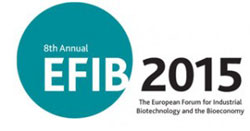BBIA has been present at several events in the past month. See below for reports from Managing Director David Newman on two such events.
Annual European Bioplastics Conference
 On 5/6 November, BBIA attended the 10th annual European Bioplastics Conference in Berlin. The event’s theme was ‘shaping smart solutions’.
On 5/6 November, BBIA attended the 10th annual European Bioplastics Conference in Berlin. The event’s theme was ‘shaping smart solutions’.
The conference opened with three keynote address. Douglas Mulhall of the Cradle to Cradle organisation showed examples of how biomaterials can create new products and take over industry supply chains. For example, he suggested the biomaterials industry needs to take over the building industry to bring clean, healthy materials to building,with measures such as banning styrofoam insulation being substituted by biomaterials and banning PVC pipes.
Biomaterials production needs to show how positive lists of healthy biomaterials are a competitive advantage. Large companies such as Google are demanding healthy ingredients with its Portico programme. Carlsberg brewers also demand Cradle to Cradle certification of ingredients including polymers and are developing a fibre biobased and biodegradable beer bottle. He emphasised that biopolymers are about quality not about quantity, for example in the medical industry its potential is enormous though volumes may not actually be huge.
Design, he concluded, is the most of the important element of the circular economy, redesigning the way we make products. Biomaterials are at the top of that process.
Reinhard Buscher from the European Commission then stated how bioeconomy is part of the policy towards low carbon economy and greater resource efficiency. He called the bioeconomy the cornerstone of a low carbon strategy, with biobased materials suitable for use in construction, furniture, packaging, coatings, etc.
Biorefineries will lead to new industrial relations, such as demand for reliable sources upstream from farmers, forestry and waste.
He underlined how the industry needs private investments not government grants. We need markets to ensure return on investment, technologies need to demonstrate they can survive with large scale plants.
To facilitate organic waste recycling separate waste collection of organics is required. Only 30 per cent of organics are separately collected across Europe. EC fertiliser regulation will create a new EU wide market for organic fertilisers, the challenge is finding markets for the new volumes of these products.
Finally, the Ellen Macarthur Foundation estimates that 32 per cent of plastics are not collected or dumped and that by 2025 the oceans will contain one tonne of plastics for every three tonnes of fish. This shocking information really requires governments to address collection systems for plastic waste.
For the European bioplastics Conference 2015 programme click here.
European Forum for Industrial Biotechnology
 BBIA attended the European Forum for Industrial Biotechnology in Brussels on 28/29 October.
BBIA attended the European Forum for Industrial Biotechnology in Brussels on 28/29 October.
Attended by over 250 participants from around the world the Forum was an opportunity for companies to showcase their new technologies and products highlighting the rapid growth in the bio-sector which is expected to run at over 20 per cent globally in 2015.
For the full programme for the European Forum for Industrial Biotechnology click here.

